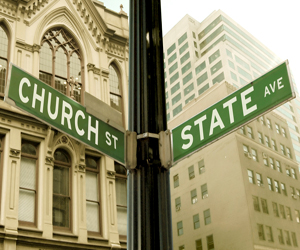 Sept. 12, 2011 – A three-judge panel of the U.S. Court of Appeals for the Seventh Circuit has ruled 2-1 that it did not violate the Establishment Clause of the First Amendment to the U.S. Constitution for two high schools to hold graduation ceremonies at a local Christian church.
Sept. 12, 2011 – A three-judge panel of the U.S. Court of Appeals for the Seventh Circuit has ruled 2-1 that it did not violate the Establishment Clause of the First Amendment to the U.S. Constitution for two high schools to hold graduation ceremonies at a local Christian church.
Brookfield Central and Brookfield East high schools, located in Waukesha County, held graduation ceremonies at Elmbrook Church (church) every year from 2002 to 2009. Each year, students voted to move graduation ceremonies out of gymnasiums for a more comfortable environment.
Each year, school administrators approved the students’ proposal to hold graduation ceremonies specifically at the church. One year, principals of both schools determined that a vote was unnecessary and selected the church on recommendation of the senior class officers.
However, several parents began complaining about the church venue and accused one school administrator of influencing decisions to hold ceremonies at the church, where he was a member.
Elmbrook School District (of which the high schools are a part) completed a field house and have used it to host graduation ceremonies since 2010. But an anonymous group of current and former students (and their parents), all non-Christians, filed suit in 2009 to address past grievances and prevent the District from using the church venue to host graduation ceremonies in the future.
The plaintiffs expressed anger that the religious setting – which included a 15- to 20-foot hanging cross and information booths with religious literature, among other things – was uncomfortable, upsetting, and in one instance, completely ruined the graduation experience for one student.
In district court, the plaintiffs argued (and lost) that the school district violated the Establishment Clause, which provides that “Congress shall make no law respecting an establishment of religion” and extends to “state actors” like public school districts. The plaintiffs appealed.
In John Doe et. al. v. Elmbrook School District, No. 10-2922 (Sept. 9, 2011), a three-judge panel upheld the district court by a 2-1 majority, concluding the school district’s use of the rented church space was neither “impermissibly coercive nor an endorsement of religion."
Judge Joel Flaum dissented, arguing that holding graduation at Elmbrook Church conveyed an impermissible message of religious endorsement that was inherently coercive.
The Lemon test
The majority – Chief Judge Frank Easterbrook and Judge Kenneth Ripple – explained that under Lemon v. Kurtzman, 403 U.S. 602 (1971), a state actor violates the Establishment Clause if its action lacks a legitimate secular purpose, has the primary effect of advancing or prohibiting religion, or fosters an excessive entanglement with religion.
The plaintiffs first argued that holding commencement ceremonies at Elmbrook Church, a decision in the ultimate hands of administrators, compelled graduates to enter a “sacred space,” a religious activity in itself, and coerced exposure to religious iconography, such as the large cross and religious literature.
But the majority reasoned that the graduates’ encounter with religion during the graduation ceremonies were “purely passive and incidental to attendance at an entirely secular ceremony."
“We do not doubt that symbols can be used to proselytize or that, in the appropriate circumstances, coerced engagement with religious iconography and messages might take on the nature of a religious exercise or forced inculcation of religion,” wrote Judge Ripple. “However, the Establishment Clause does not shield citizens from encountering the beliefs or symbols of any faith to which they do not subscribe."
Second, the plaintiffs argued that holding graduation ceremonies at the church conveyed a message of religious endorsement by the school district, even if that was not the school district’s intent, because “it creates an unavoidable symbolic link between the Church and the District."
Again, the majority disagreed, concluding that the plaintiffs did not present any evidence to show the school district associated itself with the religious symbols or with the beliefs expressed by the church.
“[T]he District’s use of a religious facility for a secular purpose does not irretrievably create a symbolic link tainting the association of the two entities,” wrote Judge Ripple, noting that Establishment Clause analysis is a fact-intensive inquiry in each case.
Finally, the majority rejected the argument that the school district’s use of the church “excessively entangled” the school district with religion by allowing the church to control the atmosphere of a public school graduation ceremony. But the majority concluded otherwise.
“In this case, there is no evidence that the Church or its members have attempted to control or influence the setting or the content of the ceremony, and there is no evidence that the District used the graduation events as a way to get the church’s message out,” Judge Ripple wrote. “Any interaction between the Church and the District regarding the setting is too de minimis to cause any real concern.”
Dissent
In dissent, Judge Flaum argued that if school administrators are prohibited from bringing church to the schoolhouse, “[t]he same result should obtain when administrators bring seminal schoolhouse events to a church – at least to one with the proselytizing elements present in this case.”
Judge Flaum noted that regardless of the administrators’ purpose in choosing a location, “the sheer religiosity of the space created a likelihood that high school students and their younger siblings would perceive a link between church and state.”
